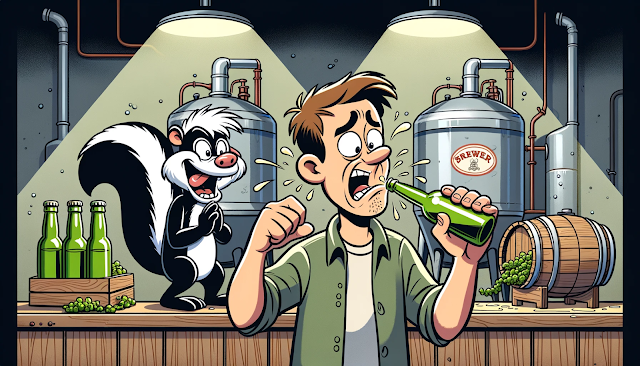There are few tragedies in brewing as swift or as pungent as a skunked beer. You spend weeks crafting the perfect batch, only to crack open a bottle and be greeted by an aroma that belongs in the wild, not in your glass. As any brewer knows, this "lightstruck" fault is one of the easiest ways to ruin your beer, but it's also one of the most preventable.
This guide is your complete defense manual. We'll break down the precise photochemical reaction that creates that dreaded aroma, explore every factor that puts your beer at risk, and provide a comprehensive playbook of techniques, from simple storage to advanced brewing science, to ensure your homebrew is never again a victim of the light.
Skunking is not a sign of infection or poor sanitation; it is a specific and rapid photochemical reaction. The trigger is light, specifically light in the blue and ultraviolet (UV) spectrums. Here’s the science:
Hops contain compounds called alpha acids. During the boil, these are transformed (isomerized) into iso-alpha-acids (or isohumulones), which are responsible for your beer's bitterness. When high-energy light waves hit your beer, they provide the energy for a photosensitizer in the beer (riboflavin, from the malt) to cleave a side chain from these isohumulones. This newly freed radical then reacts with sulfur compounds, naturally present from the yeast, to create the offending molecule: 3-methyl-2-butene-1-thiol.
Brewer's Insight: The Skunk Connection
The reason the aroma is so unmistakable isn't a coincidence. 3-methyl-2-butene-1-thiol is one of the primary, highly potent thiols that make up the defensive spray of a skunk. The human nose is incredibly sensitive to this compound, able to detect it in concentrations as low as a few parts per trillion. This means even a minuscule amount is enough to ruin the drinking experience.
Now that you understand the enemy, let's build your defenses. Preventing skunking is all about controlling one variable: light.
The Packaging Showdown: Your First Line of Defense
Your choice of packaging is the single most important decision you will make in the fight against skunking.
- Cans & Kegs (The Fortress): Offering 100% protection from all light, cans and kegs are the absolute best choice for packaging light-sensitive beers like IPAs. They are completely opaque, making the photochemical reaction impossible.
- Brown Bottles (The Castle Wall): Brown glass is an excellent defender, blocking over 90% of the harmful UV and blue light wavelengths. It is the only acceptable glass color for storing hoppy beers.
- Green & Clear Bottles (The Open Gate): These offer virtually zero protection. They allow the damaging wavelengths of light to pass through almost completely, meaning a beer in a clear bottle can become noticeably skunked in under a minute of direct sunlight.
Best Practices for Prevention
- Store Your Beer in Complete Darkness: Light exposure is the enemy, so make darkness your ally. Store your finished bottles in enclosed cardboard boxes, inside a dark closet, basement, or fermentation chamber. Never leave bottles sitting out on a counter under fluorescent kitchen lights.
- Choose Brown Bottles, or Better Yet, Kegs: When bottling, always choose brown glass. If you truly want to guarantee your beer stays in peak condition and eliminate all risk, kegging is the superior method. Kegs are essentially fortresses of stainless steel that offer absolute protection from light.
- Minimize Exposure During Handling: The reaction can happen fast, so be mindful of light during your process. When bottling and labeling, work in a dimly lit area if possible, and immediately place filled bottles into a closed box. When transporting your beer, keep it covered in a cooler or box.
- Educate Your Friends: When you share your homebrew, serve it in a glass! This is not just for presentation. It prevents the beer from warming up in the drinker's hand and protects it from any last-minute light exposure if you're enjoying it outdoors.
Advanced Topic: Why Don't Some Commercial Beers Skunk?
Ever wondered why a Corona in a clear bottle or a Heineken in a green bottle doesn't immediately skunk? These breweries use advanced, light-stable hop products. Instead of regular hops, they use chemically modified hop extracts, such as tetra-hydro iso-alpha acids. These compounds have had their light-sensitive molecular side chain removed, making them immune to the photochemical reaction. This allows them to provide bitterness without any risk of skunking, giving these brands their signature stability in less-than-ideal packaging.
Skunked beer is a preventable tragedy that every detail-oriented brewer can and should avoid. It's a simple equation: hop-derived bitterness plus light equals a ruined beer. By understanding the science and implementing robust defenses, primarily through proper packaging and dark storage, you can safeguard your beer from this light-struck disaster.
Keep it dark, keep it cool, and your beer will remain the crisp, clean, and delicious creation you intended it to be.

